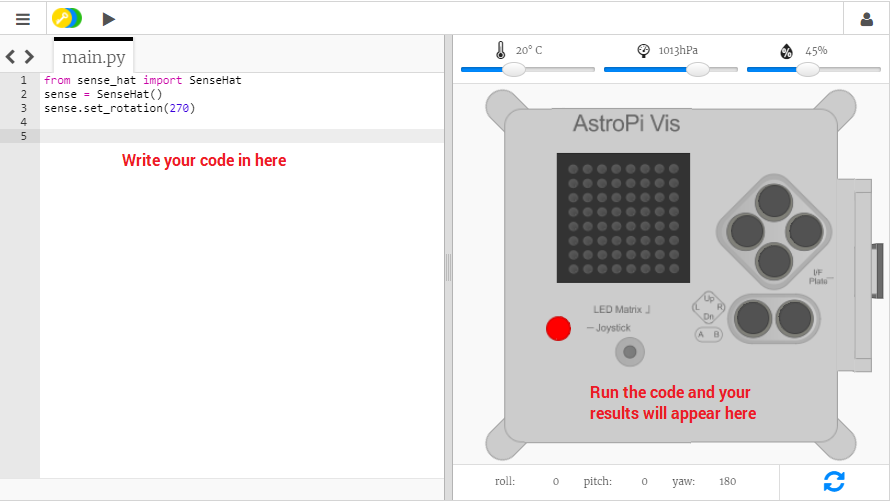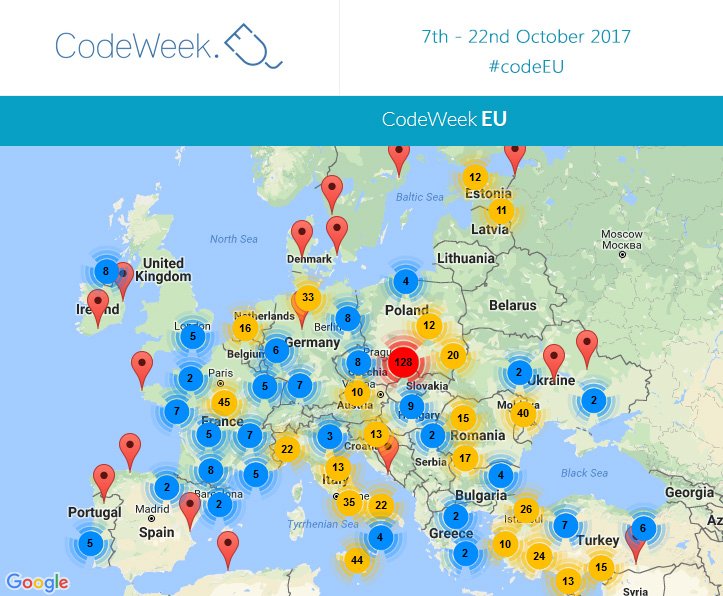Europe Code Week 2017
Europe Code Week is taking place this year between 7 and 22 October, although "every week is Code Week". It's an open source initiative, aiming to connect initiatives that encourage young and adult European citizens to learn more about the art and science of computer programming.
Millions of children, adults, parents, teachers, entrepreneurs, and policymakers will again come together at events, in classrooms and libraries across Europe and beyond to learn to create with code.
Europe Code Week 2017
EU Code Week is a grass-roots movement that celebrates creating with code. The idea is to make programming more visible, to show young, adults and elderly how you bring ideas to life with code, to demystify these skills and bring motivated people together to learn. The initiative was launched in 2013 by the Young Advisors for the Digital Agenda Europe.
5th Birthday Code Week
Europe Code Week was born in 2013 by some young people who advised the European Commission on digital policies. They wanted more people "to learn how to create with code as well as get different networks together to make it easier for interested people to find a place where they could learn programming, work with hardware and find out how computers work."
Those grass-roots movement turns five years in 2017 and it has grown exponentially.
EU Code Week is run by volunteers. One, or several, Code Week Ambassadors coordinate the initiative in their countries, but everyone can organise their own code event and add it to the codeweek.eu map.
Europe Code Week 2017
In 2016, nearly a million people in more than 50 countries around the world took part in EU Code Week. If your country is involved, and has organised events, put it on the map or volunteer as a Code Week ambassador.
Education:
Learning to code helps students to make sense of how things work, explore ideas and make things, for both work and play.
Learning to code helps students to make sense of how things work, explore ideas and make things, for both work and play.
What’s more it helps students to unleash their creativity and work collaboratively with wonderful young people both near them and all over the world.
From playing about with animations to designing computer apps and games, teaching coding in schools lends itself to plenty of fun learning activities.
The inclusion of coding into the new computing curriculum has been one of the main changes that the Department of Education in different European countries claimed would "ensure every child leaves school prepared for life in modern society."
Students at the school have apparently responded positively to the new curriculum in those countries and are already seeing the practical use of learning these new skills.
The European Astro Pi Chalenge:
Announcing the 2017-18 European Astro Pi challenge in partnership with the European Space Agency (ESA).
It's open to students from all 22 ESA member countries, including associate members Canada and Slovenia.
Astro Pi is an annual science and coding competition where code written by young people is run on the International Space Station!
Mission Zero
Students will contribute to the daily routine of the International Space Station by displaying their own personal message and the ambient air temperature on the Astro Pi.
No special hardware is needed to take part in Mission Zero, and your code is guaranteed to run in space for 30 seconds!
Some information:
In Mission Space Lab, teams aged up to 19 have to demonstrate their motivation to compete by planning an experiment to run in space.
Registration:
Teams have until 29 October 2017 to register and submit their idea on the Astro Pi website.
The selected teams will be notified that they have been accepted by 7 November 2017 and will receive an ESA-branded Astro Pi kit at their school, and the chance for their experiment to run on the International Space Station.
Teachers: this classroom activity can be completed in an afternoon.
Organise your students into teams of up to four, and let us guide them through writing a short Python program to show a personal message and the air temperature on the Astro Pi.
No extra hardware is needed. Everything is done in a web browser.
Teachers register online with the Trinket Sense HAT emulator and receive a classroom code to give to their teams. This saves time by greatly reducing the need for data entry.
There’s no limit to the number of teams a school or club can enter. It’s entirely dependent on the teacher’s capacity to support teams.
Read the official guidelines document for Mission Zero.
Resources:
The true story of a team of female African-American mathematicians who served a vital role in NASA during the early years of the U.S. space program. Segregated from their white counterparts, these colored computers’ used pencil and paper to write the equations that would launch rockets, and astronauts, into space.
Resources:
- A special film: Hidden Figures
The true story of a team of female African-American mathematicians who served a vital role in NASA during the early years of the U.S. space program. Segregated from their white counterparts, these colored computers’ used pencil and paper to write the equations that would launch rockets, and astronauts, into space.
The maths involved in the orbital mission was highly complex, and the computers of the day were prone to technical hiccups.
So as astronaut John Glenn was going through the preflight checklist – upon which his life depended – he insisted that Ms Johnson double check the calculations.
Hidden Figures
Theodore Melfi, 2016
“If she says they’re good,” Ms Johnson remembered Mr Glenn saying, “then I’m ready to go.”
Hidden Figures
Theodore Melfi, 2016
Aim:
Motivation to girls nd young women to code and continue their studies on STEM. Teachers must encourage girls to pursue studies on STEM.
Teachers can display the film in the classroom to motivate young girls to code. Boys will understand the role of young girls in STEM. Later they will support them at secondary education and college.
There is a gender lack studying high technologies and STEM.
Don't misse the opportunity to include Hidden Figures into school curriculum.
Other Activities:
Anyone – schools, teachers, libraries, code clubs, businesses, public authorities – can organise a #CodeEU event and add it to the codeweek.eu map.
To make organising and running coding events easier, the CodeWeek website has prepared different toolkits and selected some of the best lesson plans, guides and other resources. Look here
Code Week EU is on Twitter as @CodeWeekEU, on Facebook. Use the #codeEU hashtag.
Invite your students to have fun building things by coding. Are they ready to share their passion? Young students are so creative. Let's them explore all the funny coding games with their imagination.
06.10.2017
Copyright © 2017G-Souto'sBlog, gsouto-digitalteacher.blogspot.com®
 Schools : Code Week EU, new challenges : Let's go again ! by G-Souto is licensed under a Creative Commons Attribution-NonCommercial-NoDerivatives 4.0 International License.
Schools : Code Week EU, new challenges : Let's go again ! by G-Souto is licensed under a Creative Commons Attribution-NonCommercial-NoDerivatives 4.0 International License.
Media:
Invite your students to have fun building things by coding. Are they ready to share their passion? Young students are so creative. Let's them explore all the funny coding games with their imagination.
G-Souto
06.10.2017
Copyright © 2017G-Souto'sBlog, gsouto-digitalteacher.blogspot.com®










No comments:
Post a Comment